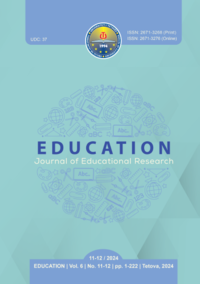NEUROLOGICAL DISABILITY AMONG ADULTS WITH ACUTE STROKE
NEUROLOGICAL DISABILITY AMONG ADULTS WITH ACUTE STROKE
Author(s): Bajram KAMBERI, Drenusha KAMBERISubject(s): Education
Published by: University of Tetova
Keywords: stroke; ischemic; hemorrhagic; neurological disabily
Summary/Abstract: Background: Neurological disability, also known as a neurological disorder, is simply described as an impairment in a person's nervous system that affects their bodily or mental functions. Aim: To investigate stroke-related disability in hospitalized patients during the 13-month period (January 2022 to January 2023). Methods: The present study was a descriptive as well as a comparative study. Target parameters were collected from medical documentation that was generated during patient treatment. Was compared the baseline frequency of neurological disability expressed as neurological deficit associated with acute stroke in hospitalized patients. Results: For the specified period, a total of 205 patients, as acute stroke cases were diagnosed, 104 (50.73%) males and 101 (49.27%) women. Acute ischemic stroke was the first most common cause of stroke, account for 81.95% of hospital admission for stroke, while acute hemorrhagic stroke was the second most common cause of stroke, account for 18.05%. The most frequent neurological deficit was left-sided hemiplegia 59/205 (28.78%), right-sided hemiparesis in the second order 52/205 (25.36%) and, in third order was right-sided hemiplegia 44/205 (21.46%). The three neurological deficits with the lowest frequency were:sensory-motor dysphasia 38/205 (18.54%), left-sided hemiparesis 35/205 (17.07%) and sensory-motor aphasia in 24/205 (11.71%) of cases. Conclusion: Regarding the baseline frequency of neurological deficit, the medical model of disability was prevalent. We think there is a need for a comprehensive format for neurological disabilities assessment, which will also include the three main components of the definition of disability from WHO (2001): impairments, activity limitations and participation limitations.
Journal: EDUCATION – Journal of Educational Research
- Issue Year: 6/2024
- Issue No: 11-12
- Page Range: 151-160
- Page Count: 10
- Language: English

